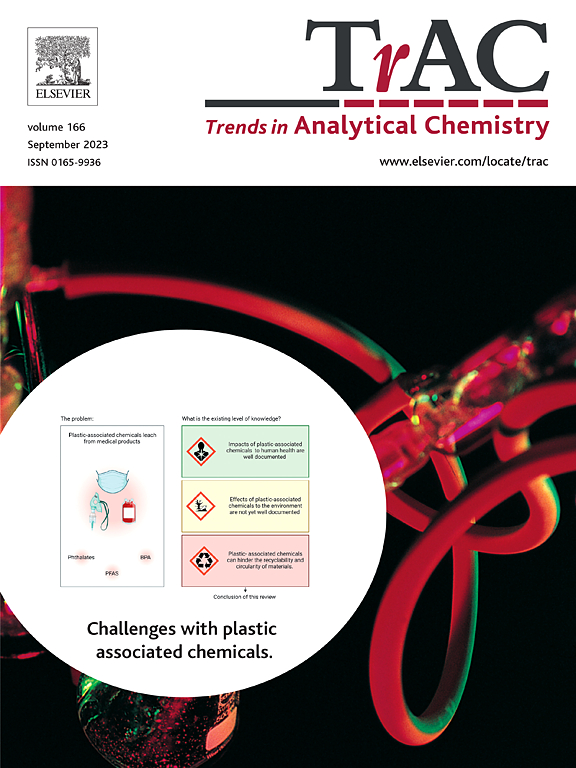中药代谢研究进展:样品前处理、质谱分析策略及典型应用
IF 12
1区 化学
Q1 CHEMISTRY, ANALYTICAL
引用次数: 0
摘要
了解复杂的中药成分是如何被吸收、分布、代谢和消除的,对于确定外源性化学物质(原型和代谢物)对生物体(人类和动物)的影响至关重要。面向质谱(MS)的分析策略,结合多种分析工具,已主要用于全面破译中医代谢。在近十年来中医药代谢的整个工作流程中,生物样品预处理、质谱数据采集和数据处理都取得了很大进展。以MS为依托的生物样品前处理、最新数据采集和数据处理策略为重点,以964篇相关文献为基础,比较概述了2015年至2024年报道的先进分析技术的基本原理和特点,以及在中医代谢各种场景中的典型应用。以期为中药及其各成分代谢研究提供方法学上的参考。本文章由计算机程序翻译,如有差异,请以英文原文为准。

Recent advances in traditional Chinese medicine metabolism: Sample pre-treatment, MS-oriented analytical strategies and typical applications
Understanding of how complex traditional Chinese medicine (TCM) components are absorbed, distributed, metabolized, and eliminated is crucial to determine the impacts of the exogenous chemicals (prototypes and metabolites) to the organism (humans and animals). Mass spectrometry (MS)-oriented analytical strategies, combined with versatile analysis tools, have been predominantly utilized to comprehensively decipher TCM metabolism. Among the entire workflows involved in TCM metabolism occurring in the last decade, great advances are gained regarding the bio-samples pre-treatment, MS data acquisition, and data processing. By focusing on the biological samples pre-treatment, state-of-the-art data acquisition and data processing strategies relying on MS, we comparatively outline the basic principles and characteristics of the developed analytical techniques reported from 2015 to 2024, and the typical applications in various scenarios of TCM metabolism, based on 964 related publications. It is expected to offer a methodological reference to the researchers in metabolism studies of TCM and its various components.
求助全文
通过发布文献求助,成功后即可免费获取论文全文。
去求助
来源期刊

Trends in Analytical Chemistry
化学-分析化学
CiteScore
20.00
自引率
4.60%
发文量
257
审稿时长
3.4 months
期刊介绍:
TrAC publishes succinct and critical overviews of recent advancements in analytical chemistry, designed to assist analytical chemists and other users of analytical techniques. These reviews offer excellent, up-to-date, and timely coverage of various topics within analytical chemistry. Encompassing areas such as analytical instrumentation, biomedical analysis, biomolecular analysis, biosensors, chemical analysis, chemometrics, clinical chemistry, drug discovery, environmental analysis and monitoring, food analysis, forensic science, laboratory automation, materials science, metabolomics, pesticide-residue analysis, pharmaceutical analysis, proteomics, surface science, and water analysis and monitoring, these critical reviews provide comprehensive insights for practitioners in the field.
 求助内容:
求助内容: 应助结果提醒方式:
应助结果提醒方式:


